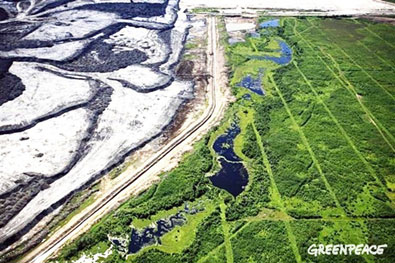If Canada follows through on the new path it’s on, we should finally be clear of its deadly tar sands expandarama.
The latest from Prime Minister Trudeau is that all new fossil fuel infrastructure – pipelines and and a LNG terminal planned for British Columbia – will have to pass the climate test.
Since tar sands pipelines can’t pass any climate test, if the government actually analyzes the impacts, no more will be built. We look forward to the final and complete rejection of Energy East and Trans Mountain pipelines, which have no other purpose that transporting tar sands oil for export.
Read our article, 100 Scientists Call For Tar Sands Moratorium in Canada.
Tar sands extraction has turned the boreal forest into a moonscape:
"The federal role is to put into place a process by which TransCanada and any other company can demonstrate their projects are in the public interest and have public support," Trudeau told reporters.
"And what we are going to roll out very soon, as we promised in our election campaign, is to establish a clear process which will consider all the greenhouse gas emissions tied to a project."
He also promised that local governments and indigenous tribes would be full participants in these decisions – an about face from the previous Prime Minister, Stephen Harper.
"It’s not just governments which give permits. Communities must also give their approval," says Trudeau.
"There is a lot of cautious optimism, though people have been conditioned to expect the worst from Ottawa, especially with regard to the environment and indigenous rights," says Kai Nagata at the Dogwood Initiative.
"It’s an enormous relief that the Harper decade is finally over," says Keith Stewart at Greenpeace Canada.
Tzeporah Berman, co-founder of Forest Ethics, says she "cried like a baby" when she read Trudeau’s first environmental memos," reports Sierra.
Read our article, Congratulations Canada! For Throwing Harper Out, which details Trudeau’s initial promises.
After his election, Trudeau renamed Canada’s environment ministry to "Ministry of Environment and Climate Change," and followed that with actions like banning oil tanker traffic on British Columbia’s north coast – effectively killing the Northern Gateway pipeline. Gee, he even made a point of allowing government scientists to speak freely to the media without fear of losing their job!
Besides the climate impacts of tar sands oil, banning oil tankers protects the ecologically sensitive coast from becoming an industrial zone where hundreds of dangerous tankers would have traveled each year. Two pipelines would have carried 525,000 barrels of tar sands oil from Alberta to the coast every day, winding their way across critical salmon habitat in rivers and through coastal rainforests.
Enbridge, of course, still plans to move forward on the pipeline, noting that it’s being doing a good job of convincing First Nations and other citizens of its value. Good luck!
Alberta’s New Path
Since the Liberal Party won in Alberta last year, the provincial government has been steadily moving into the 21st century.
As the tar sands headquarters of the world, it’s amazing to hear that it will tax carbon emissions economy-wide starting in 2017 and will phase out all coal-fired power plants by 2030 they do not capture carbon.
This is expected to result in about $2.25 billion a year, which will be spent on to diversify into efficiency, renewable energy, and public transportation. Some of the funds will go toward research and some will offset financial assistance to help affected families and small businesses.
Two-thirds of the electricity generated by coal will be replaced with renewables – mostly wind – and the rest from natural gas. The goal is to source 30% of electricity from renewables by 2030.
The carbon tax starts at C$20 ($14.93) in 2017 and rises to C$30 the next year. The policy also caps emissions from tar sands extraction, but allows emissions to grow from current levels of 70 million tons a year to 100 million tons – basically halting new construction.
Clearly, tar sands extraction needs to decline, rather than grow, but the cap prevents expansion, which if the industry had their way would double or even quintuple.
The government also plans to cut methane emissions 45% by 2025 from 2014 levels.
"Alberta is leading again, my friends … We’re going to stop being the problem, and we’re going to start being the solution, so Alberta goes back to the role we should be playing on energy and environment issues," says Rachel Notley, Alberta’s new premier.
Read our article, Canada Leads the World … On Forest Degradation
